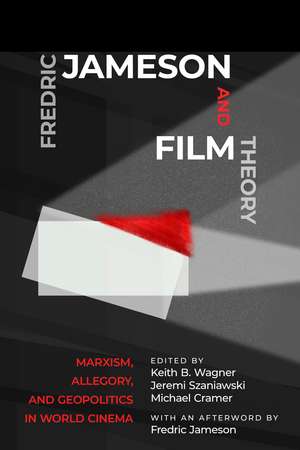Fredric Jameson and Film Theory: Marxism, Allegory, and Geopolitics in World Cinema
Editat de Keith B. Wagner, Jeremi Szaniawski, Michael Cramer Contribuţii de Dudley Andrew, John Mackay, Paul Coates, Pansy Duncan, Naoki Yamamoto, Mercedes Vazquez, Alvin K. Wong, Dan Hassler-Forest, Mike Wayne, Fredric Jamesonen Limba Engleză Paperback – 14 ian 2022
Preț: 233.25 lei
Nou
Puncte Express: 350
Preț estimativ în valută:
44.63€ • 46.72$ • 36.93£
44.63€ • 46.72$ • 36.93£
Carte disponibilă
Livrare economică 17-31 martie
Preluare comenzi: 021 569.72.76
Specificații
ISBN-13: 9781978808867
ISBN-10: 1978808860
Pagini: 278
Dimensiuni: 156 x 235 x 20 mm
Greutate: 0.34 kg
Editura: Rutgers University Press
Colecția Rutgers University Press
ISBN-10: 1978808860
Pagini: 278
Dimensiuni: 156 x 235 x 20 mm
Greutate: 0.34 kg
Editura: Rutgers University Press
Colecția Rutgers University Press
Notă biografică
KEITH B. WAGNER is an assistant professor of global media and culture and director of doctoral research in film and media studies at University College London in the United Kingdom. He is the coeditor of Neoliberalism and Global Cinema: Capital, Culture and Marxist Critique.
JEREMI SZANIAWSKI is an assistant professor of film studies and comparative literature, and the Amesbury Professor of Polish language and culture at the University of Massachusetts at Amherst. He is the author of The Cinema of Alexander Sokurov: Figures of Paradox.
MICHAEL CRAMER is a professor of cinema studies at Sarah Lawrence College in Bronxville, New York. He is the author of Utopian Television: Roberto Rossellini, Peter Watkins, and Jean-Luc Godard Beyond Cinema.
JEREMI SZANIAWSKI is an assistant professor of film studies and comparative literature, and the Amesbury Professor of Polish language and culture at the University of Massachusetts at Amherst. He is the author of The Cinema of Alexander Sokurov: Figures of Paradox.
MICHAEL CRAMER is a professor of cinema studies at Sarah Lawrence College in Bronxville, New York. He is the author of Utopian Television: Roberto Rossellini, Peter Watkins, and Jean-Luc Godard Beyond Cinema.
Cuprins
Introduction: Always Historicize the Moving Image! Fredric Jameson’s Place in Film Studies
MICHAEL CRAMER, JEREMI SZANIAWSKI, AND KEITH B. WAGNER
1 Feeling Film as the Pulse of the Postmodern Condition: On Jameson’s “On Diva”
DUDLEY ANDREW
2 Allegory and Accommodation: Vertov’s Three Songs of Lenin (1934) as a Stalinist Film
JOHN MACKAY
3 Nostalgia, Melancholy, and the Persistence of Stalin in Polish Cinema
JEREMI SZANIAWSKI
4 Jameson, Angelopoulos, and the Spirit of Utopia
PAUL COATES
5 Jameson and Japanese Media Theory: A Virtual Dialogue
NAOKI YAMAMOTO
6 Where Jameson Meets Queer Theory: Queer Cognitive Mapping in 1990s Sinophone Cinema
ALVIN K. WONG
7 A Jamesonian Reading of Parasite (2019): Homes, Real Estate Speculation, and Bubble Markets in Seoul
KEITH B. WAGNER
8 Strategies of Containment in Middle-Class Films from Mexico and Brazil
MERCEDES VÁZQUEZ
9 The Neoliberal Conspiracy: Jameson, New Hollywood, and All the President’s Men
MICHAEL CRAMER
10 The Conspiracy Film, Hollywood’s Cultural Paradigms, and Class Consciousness
MIKE WAYNE
11 A Theory of the Medium Shot: Affective Mapping and the Logic of the Encounter in Fredric Jameson’s The Geopolitical Aesthetic
PANSY DUNCAN
12 “An American Utopia” and the Politics of Military Science Fiction
DAN HASSLER-FOREST
Afterword
FREDRIC JAMESON
Acknowledgments
Notes on Contributors
Index
MICHAEL CRAMER, JEREMI SZANIAWSKI, AND KEITH B. WAGNER
1 Feeling Film as the Pulse of the Postmodern Condition: On Jameson’s “On Diva”
DUDLEY ANDREW
2 Allegory and Accommodation: Vertov’s Three Songs of Lenin (1934) as a Stalinist Film
JOHN MACKAY
3 Nostalgia, Melancholy, and the Persistence of Stalin in Polish Cinema
JEREMI SZANIAWSKI
4 Jameson, Angelopoulos, and the Spirit of Utopia
PAUL COATES
5 Jameson and Japanese Media Theory: A Virtual Dialogue
NAOKI YAMAMOTO
6 Where Jameson Meets Queer Theory: Queer Cognitive Mapping in 1990s Sinophone Cinema
ALVIN K. WONG
7 A Jamesonian Reading of Parasite (2019): Homes, Real Estate Speculation, and Bubble Markets in Seoul
KEITH B. WAGNER
8 Strategies of Containment in Middle-Class Films from Mexico and Brazil
MERCEDES VÁZQUEZ
9 The Neoliberal Conspiracy: Jameson, New Hollywood, and All the President’s Men
MICHAEL CRAMER
10 The Conspiracy Film, Hollywood’s Cultural Paradigms, and Class Consciousness
MIKE WAYNE
11 A Theory of the Medium Shot: Affective Mapping and the Logic of the Encounter in Fredric Jameson’s The Geopolitical Aesthetic
PANSY DUNCAN
12 “An American Utopia” and the Politics of Military Science Fiction
DAN HASSLER-FOREST
Afterword
FREDRIC JAMESON
Acknowledgments
Notes on Contributors
Index
Recenzii
"[The essays] demonstrate the range of interpretive projects made possible in the Jamesonian mode, the 'geopolitical aesthetic,' as it were, entailed in the study of the cultures generated in globalized capitalism. These collected essays bear out the editors’ belief that Jameson's film theory might be a missing link that authorizes nuanced historiography without divesting the field of its critical powers."
"This exciting volume explicates the Jamesonian project while also extending and—sometimes—taking issue with it. It will be regarded as a major landmark in film studies."
"This collection offers a thoughtful reckoning with the impact of Jameson's work on film studies to date while also charting a critical agenda for a Jamesonian film studies to come. Drawing on an international range of scholars Fredric Jameson and Film Theory answers Jameson's call to map the relation of individual films to the world-system of capitalism, illuminating along the way exciting new avenues for film theory and criticism."
"The excellent essays collected here revisit some of Jameson’s explicit filmic engagements before scaling out to explore the wider utility of Jamesonian theoretical models in contexts that he did not necessarily address. In so doing, Fredric Jameson and Film Theory exemplifies one of its central claims, the importance of Jameson’s work for thinking about the 'global turn' in film studies."
Descriere
A radical new intervention into film studies and Marxist cultural studies, this book considers the contributions of Fredric Jameson to film Studies, and finds scholars applying, questioning, and developing his ideas in a wide-ranging collection of case studies from around the globe.
